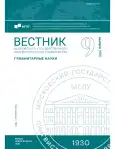О языке «Книги песен» Петрарки в контексте русских переводов последних лет
- Авторы: Якушкина Т.В.1
-
Учреждения:
- Университет РЕАВИЗ, Санкт-Петербург, Россия
- Выпуск: № 9(903) (2025)
- Страницы: 132-139
- Раздел: Литературоведение
- URL: https://journal-vniispk.ru/2542-2197/article/view/342507
- ID: 342507
Цитировать
Аннотация
Последние переводы «Книги песен» актуализировали вопрос о языке источника. Несмотря на разные стратегии, их объединяющей особенностью стала лексическая неоднородность, которая представляет книгу Петрарки как памятник, в котором совмещаются разные лексические пласты и стилистические регистры. Цель работы – охарактеризовать языковые свойства «Книги песен» в их соотнесении с задачами перевода. Анализ и обобщение лингвистических исследований последних лет позволили заключить: язык памятника – это не живой народный язык, а язык облагороженный и возвышенный, следующий задаче volgare illustre. Соответственно, лингвистическая стратегия переводчика «Книги песен» должна совпадать с магистральной лингвистической задачей самого памятника – сублимацией языка. Только при таком условии удается передать языком перевода эффект, порождаемый на языке оригинала.
Об авторах
Татьяна Викторовна Якушкина
Университет РЕАВИЗ, Санкт-Петербург, Россия
Автор, ответственный за переписку.
Email: yaku0149@hotmail.com
доктор филологических наук, доцент, профессор кафедры истории, гуманитарных и социоэкономических дисциплин
РоссияСписок литературы
- Якушкина Т. В. «Книга песен» Петрарки в России: трудный путь обретения или все еще впереди? // Сборник по итогам международной конференции. Проблемы художественной антропологии и литературной компаративистики, 13-15 ноября, 2023 года / составители: Т. В. Шевцова, С. А. Дулова. Архангельск: Северный Арктический федеральный университет имени М. В. Ломоносова, 2024. С. 252–258.
- Алисова Т. Б., Челышева И. И. История итальянского языка: от первых памятников до XVI в. М.: Московский государственный университет имени М.В. Ломоносова, 2009.
- Батюшков К. Н. Петрарка // Вестник Европы. 1816. Ч. LXXXVI. № 7. С. 171–192.
- Хлодовский Р. А. Франческо Петрарка. Поэзия гуманизма. М.: Наука, 1974.
- Хлодовский Р. А. Франческо Петрарка // История литературы Италии. М.: ИМЛИ РАН, Наследие, 2000. Т. 1. Средние века / отв. ред. М. Л. Андреев, Р. И. Хлодовский. С. 399–449.
- Ferguson C. A. Diglossia // Word. 1959. Vol. 15. P. 325–340.
- Степанова Л. Г. Итальянская лингвистическая мысль ХIV–ХVI веков (от Данте до позднего Возрождения). СПб.: Издательство Российского христианского гуманитарного института, 2000.
- Trovato P. Dante in Petrarca. Firenze: Olschki, 1979.
- Pastore Stocchi M. Petrarca e Dante // Rivista di studi danteschi. 2004. Fasc. 1. P. 184–204.
- Contini G. Preliminari sulla lingua del Petrarca: saggio introduttivo // Petrarca F. Canzoniere. Torino: Einaudi, 1992. P. XXVIII-XXXVIII.
- Vitale M. La lingua del Canzoniere (“Rerum vulgarium fragmenta”) di F. Petrarca. Roma: Antenore, 1996.
- Manni P. Storia della lingua italiana. Il Trecento toscano. La lingua di Dante, Petrarca, Boccaccio / a cura di F. Bruni. Bologna: Mulino, 2003.
- Cella R. La lingua di Petrarca. Bologna: Mulino, 2023.
- Девятайкина Н. И. Цели и способы цитирования авторов в трактате Петрарки «О средствах против превратностей судьбы» (диалог «О пении и приятности музыки») // Люди и тексты: исторический альманах. 2014. № 4. С. 119–137.
- De Nolhac P. M. Pétrarque et Humanisme, d’après un essai de restitution de sa bibliothèque. Paris: Émile Bouillon, 1892.
- Gardini N. Un esempio di imitazione virgiliana nel Canzoniere petrarchesco: Il mito di Orfeo // Modern Language Notes. 1995. Vol. 110, № 1 (Italian Issue). P. 132–144.
Дополнительные файлы











